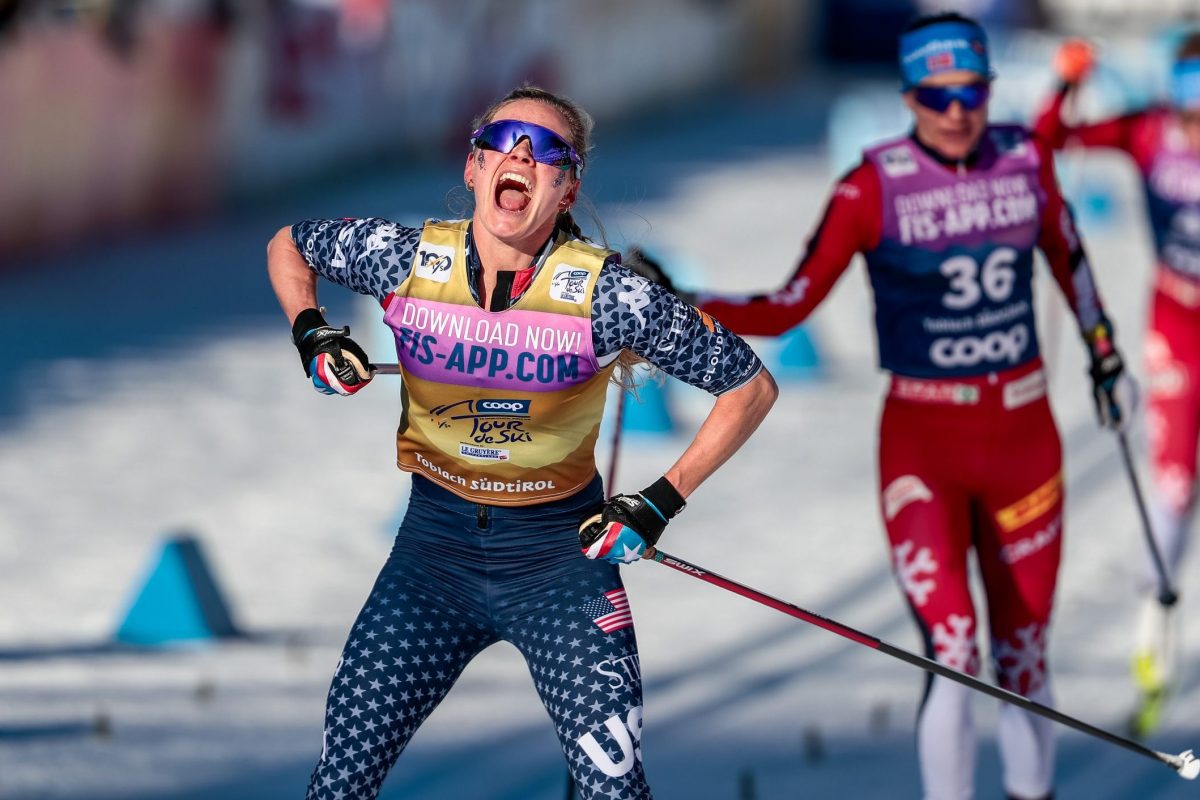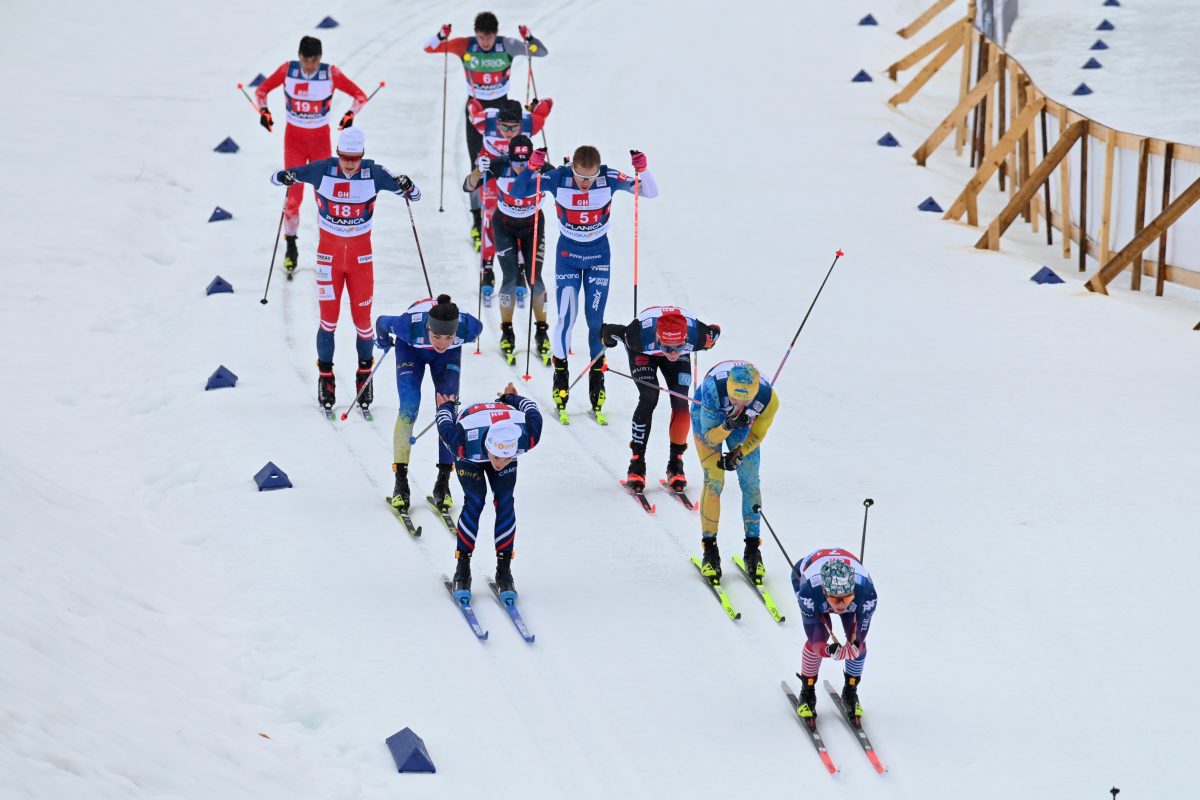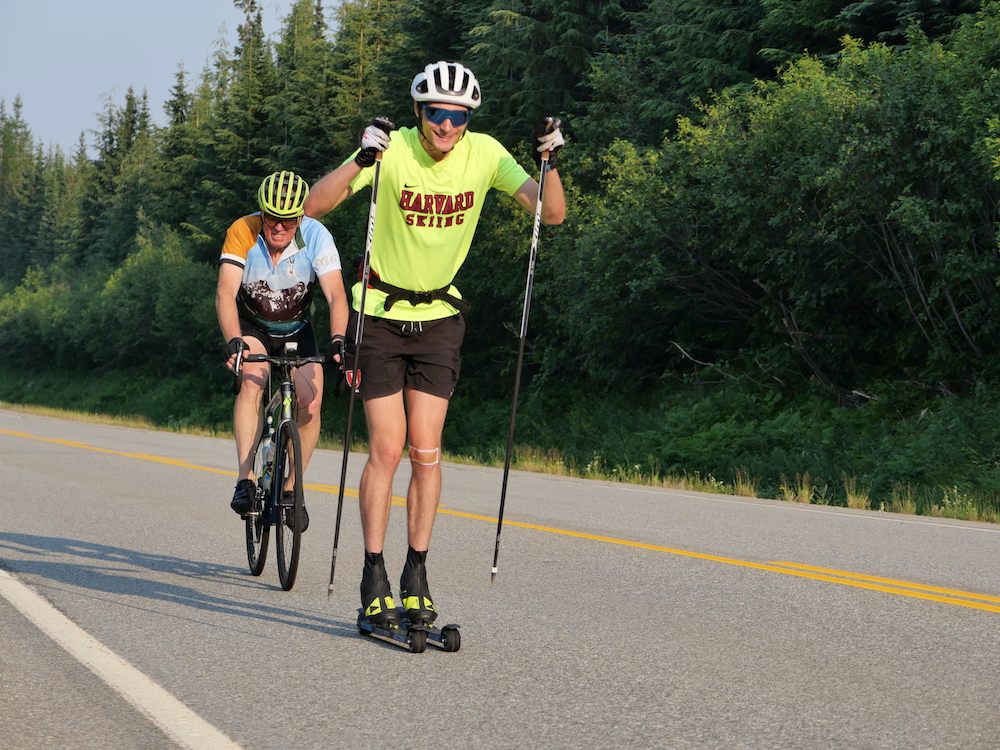
Rossland, BC native Rémi Drolet had a lot going on during the first year of the pandemic. In his first year on the Canadian senior national ski team, he was studying theoretical physics at Harvard.
His junior career ended with a silver medal and an individual fourth place in the 2020 World U20 Championships, right before COVID cancelled the final World Cups and Canadian Senior Nationals. This was also his first season living in a foreign country as an Ivy league freshman.
The previous (18/19) season, as an 18 year old, he collected two silver medals at Senior Nationals behind Lenny Valjas before his first World Cup starts. Drolet was the third best Canadian in the Québec mini-tour, beaten only by retiring athletes Alex Harvey and Valjas.
These results put him onto the national team as a first year senior, and also set expectations high for the 20/21 season.
FasterSkier caught up to Drolet at home in Rossland, suitably distanced in a park near his home. After a brief publishing delay related to this author’s day job, Drolet updated his status in an email from Muonio, Finland.
University Life
Pandemic life in the USA last season was remarkably varied, depending on the state a skier lived in.
“I wasn’t able to actually make it to Boston itself,” Drolet explained. “All classes were online, which made some things difficult. And I definitely miss being there, miss seeing all my friends.”
Collectively, IVY League schools cancelled all sports programs for the 2020-2021 academic year, leaving student-athletes in a challenging predicament.
“A lot of athletes and a lot of other athletes at Harvard just decided to take a leave of absence and take the year off because of that. Even then there were very few students who were allowed on campus, basically, just certain years and those students that needed to be there for personal reasons.”
In terms of his individual handling of the circumstances, Drolet shared a silver lining.
“[There were] some logistical issues, but overall, I think I took advantage of it pretty well, because I was able to be living at home the whole year.”
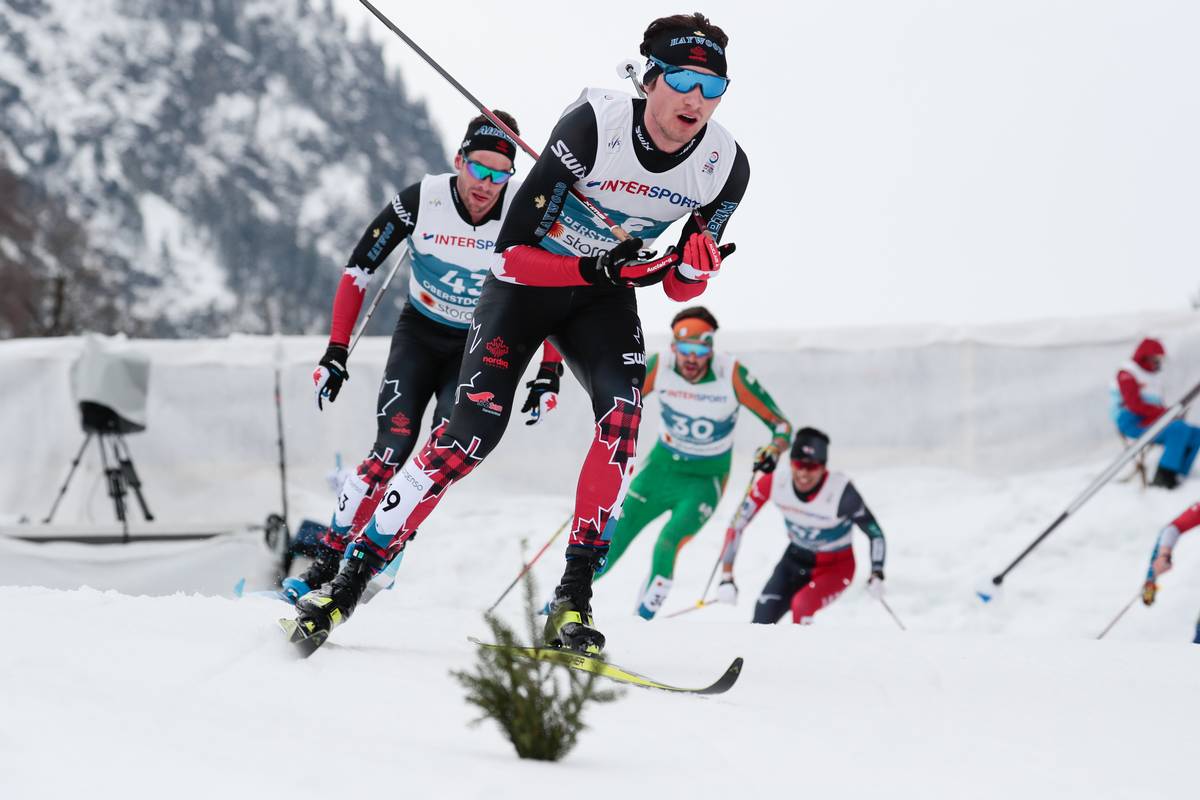
Rossland is an outdoor enthusiast’s heaven. There are endless trail options, nicely paved roads, and a small population which ensures a minimum of traffic on roller ski routes. The Rossland Range, an offshoot of the Monashee Range, provides moderate elevation including the famous Seven Summits trail. FasterSkier, in Rossland on a mountain bike vacation, saw Drolet rollerskiing while driving to the campsite before running into coach Dave Wood at the grocery store.
At the Races
There were no FIS races in Canada last season. None.
As best FasterSkier can determine, the Canadian who got the most starts in the 20/21 season was Sam Hendry, who was studying and skiing at the University of Utah. For Canadians not attending school in the US, the only options were the World Cup and World Championships. Pandemic restrictions in British Columbia included skiing only at your home trails, which meant most athletes weren’t able to train with their peers from other clubs. Clubs could organize interval start ‘races’ for one training group at a time.
“My first race of the year was the World Cup in Lahti,” recalled Drolet.
That first race was the 30km skiathlon, won by Emil Iversen in a Norwegian sweep. Most of the athletes had raced multiple WC weekends or the Tour de Ski already. While some of the countries skipped some weekends, those athletes were able to enter Scando Cup races during the break.
Logistics at the World Cup
It’s no secret that moving country to country, each with slightly different restrictions and rules in place, to follow the World Cup poses challenges during a global pandemic.
“Even beyond the fact that we hadn’t had any races, it was a lot of logistical issues just coming there. We had to be careful with COVID and try and navigate inconsistent regulations at the venues. For example, that first weekend in Lahti, we had some false positives on the team, and so we all got put into quarantine right before the relay race. And then, probably an hour before the start of the race, we all got told that they were false positives, and the wax techs just ran to the wax truck and prepared skis as best as they could. It was definitely a challenge to get it all together.”
After time to rest and digest, Drolet reflected on his racing and training during what was hopefully the apex of challenges amidst the pandemics.
“I think this whole year wasn’t, wasn’t my best racing year. We had a couple training errors leading up into the season, kind of related to a lot of fatigue from school that was managed poorly going into the World Cups.”
With a short racing season, there wasn’t much time to change course. Returning to Canada to reset would have required quarantining at home instead of training.
“Things gradually improved throughout the season, and I got a couple of decent races in, but not totally where I want it to be… I think I definitely learned a lot of things that I should do. And a lot of things I should be careful to avoid to manage energy properly and be as ready as I can for each race.”
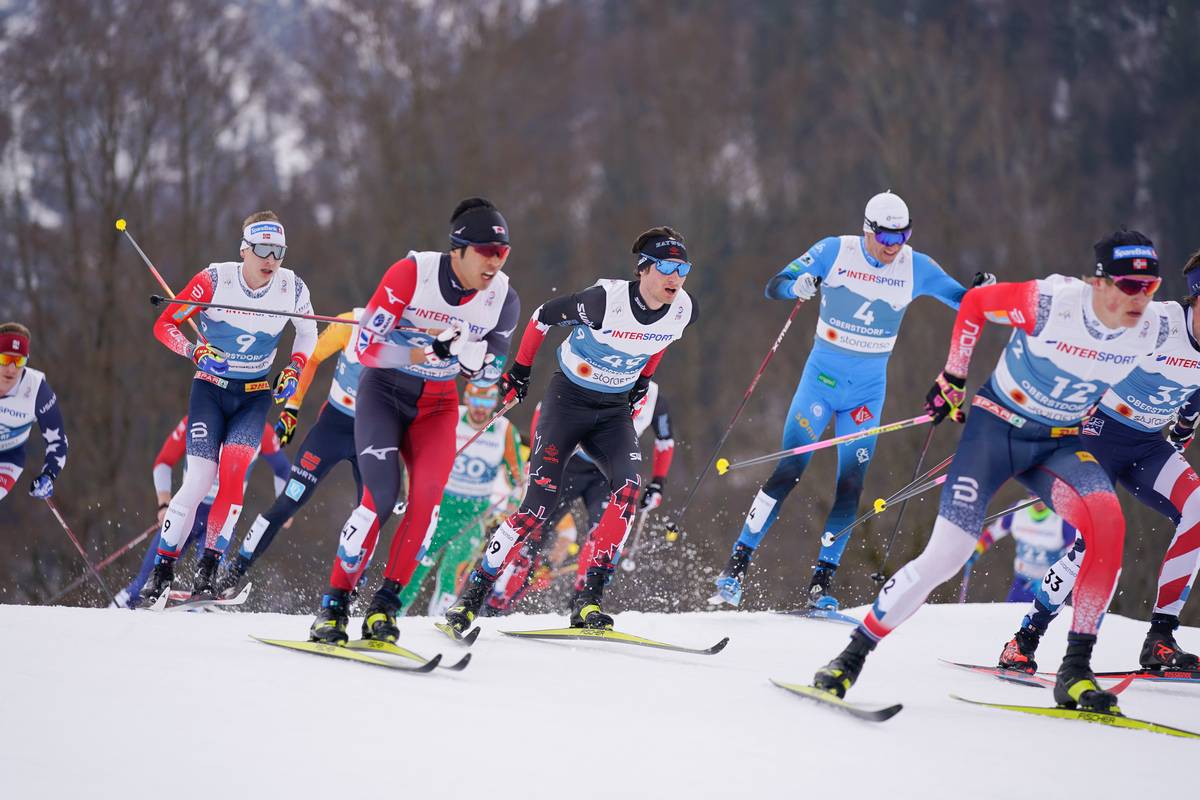
Coaching
Drolet had two coaches last season. Erik Bråten was the national team coach and Dave Wood was his personal coach. Drolet shared that he is happy to again work with Bråten this season, as he will be the WC coach in Europe for 21/22.
“I think he’s very good at fostering a strong team atmosphere and making sure everything’s well organized and that athletes don’t have to think about every small detail all the time. And that makes a really big difference so that you can just get up and kind of focus on training. And he was very accommodating. Especially for me to do a lot of schoolwork while I was over there.”
While working in Canada for NC, Bråten often promoted the idea that skiers need to race in Europe to learn what the standard is and then return to their home training environment to raise their skiing to that level. Drolet agreed with this approach.
“I found it really hard to judge how I stacked up to the rest of the world, and just how fast I needed to be. What benchmarks I needed to be hitting. I mean, you see some data, but it’s hard to really see what that feels like until you’ve actually done it. It also brings a lot of confidence, I think, knowing exactly what you need to achieve, kind of makes it more tangible, rather than just chasing something more abstract.”
There are few things more abstract than theoretical physics, but Drolet is clearly energized by a concrete sense of where he needs to be.
Dave Wood spent many years as head coach at Cross Country Canada, working with athletes like Beckie Scott and Devon Kershaw. He moved to Rossland to become the head coach of the Black Jack club team just as Drolet aged out of Track Attack.
“Pretty much everything I know about being an athlete, I know from Dave. And I definitely wouldn’t be where I am without him… One thing he’s really taught me that’s important is: ‘to be good, you have to be good at being good.’ And I guess to clarify… you need to set yourself up for success, rather than just doing the minimum and getting to the start line.”
The 21/22 Training Season
Drolet committed to taking a gap year from Harvard to focus on skiing, with the hope of racing period 1 of the World Cup and qualifying for Beijing. There were three national team camps, three more than in 2020. The first, scheduled for Penticton, was moved to Vancouver Island to escape extreme wildfire smoke.
The second camp was in Mammoth, California, a Canadian tradition for elevation training.
“The training camp in California, especially, was excellent, and we got in some good hours at altitude to get ready for the season,” Drolet wrote from Muonio. “I always love the time we spend down there and it was really great to have the whole team together for a few weeks. Eric de Nys also started on as the Development coach, and he has been doing a great job so far!”
The final camp was Frozen Thunder in Canmore, which in the current travel climate is even more important for spending hours on snow before the season starts.
When Nordiq Canada published the list of athletes selected for period 1, the list of names was short, and Drolet’s name was not present.
“I would have liked to go, but I did not race fast enough last year to qualify.”
Adversity is a large part of being a ski racer and the response to each challenge is revealing. Drolet is not arguing legal interpretations of the criteria or motivations of the selectors here, focusing instead on what he can control.
Racing Again
De Nys led a group of Canadians to early season races in Finland and Sweden.
On November 12th in Muonio, FIN, Drolet was 25th in the classic sprint, one of three Canadians to qualify for the heats. Some names in the final are familiar to ski fans: Sergey Ustiugov, Federico Pellegrino, and Erik Valnes have all won world cups.
The next day, the 15km classic was dominated by Norway and Russia, with only Iivo Niskanen in first and Drolet in 15th adding colour to the top 16.
“The racing in Muonio is not necessarily so different from racing at a NorAm or a Canada Cup,” Drolet wrote. “You still get ready the same way and show up on race day ready to race as fast as possible. There are some things that are different, though. First off, you need to deal with jet lag and be really on it so that you are properly rested for the races. The whole setup is also a bit different. “
This trip was planned as a learning experience for the NexGen athletes.
“Everyone stays at one big hotel and eats at the same restaurant, which makes it feel like more of a big event. It just feels more concentrated. Then, of course, some of the world’s top skiers show up, so the competition is a lot stiffer than when racing in Canada. I think if there’s anything I’ve learned it would just be a reinforcement of the importance of managing your time outside the races as effectively as possible.”
“Whether it is just meals and proper rest or the warmup for your race, there are small things that the best do better. It is good to be able to observe what they do and try to incorporate it myself.”
Drolet finished the Muonio 15km 1:42 behind Niskanen and 50 seconds behind Ustiugov.
“I am satisfied with the results in Muonio,” he wrote. “I am judging them by a combination of time gaps, placing, and execution. I think it was overall not bad for the first races of the year, and I hope I can keep improving as I get more competitions under my belt.”
The next weekend, the Canadians moved from Muonio to Gällivare in Sweden where Drolet finished 17th and 16th in the distance races.
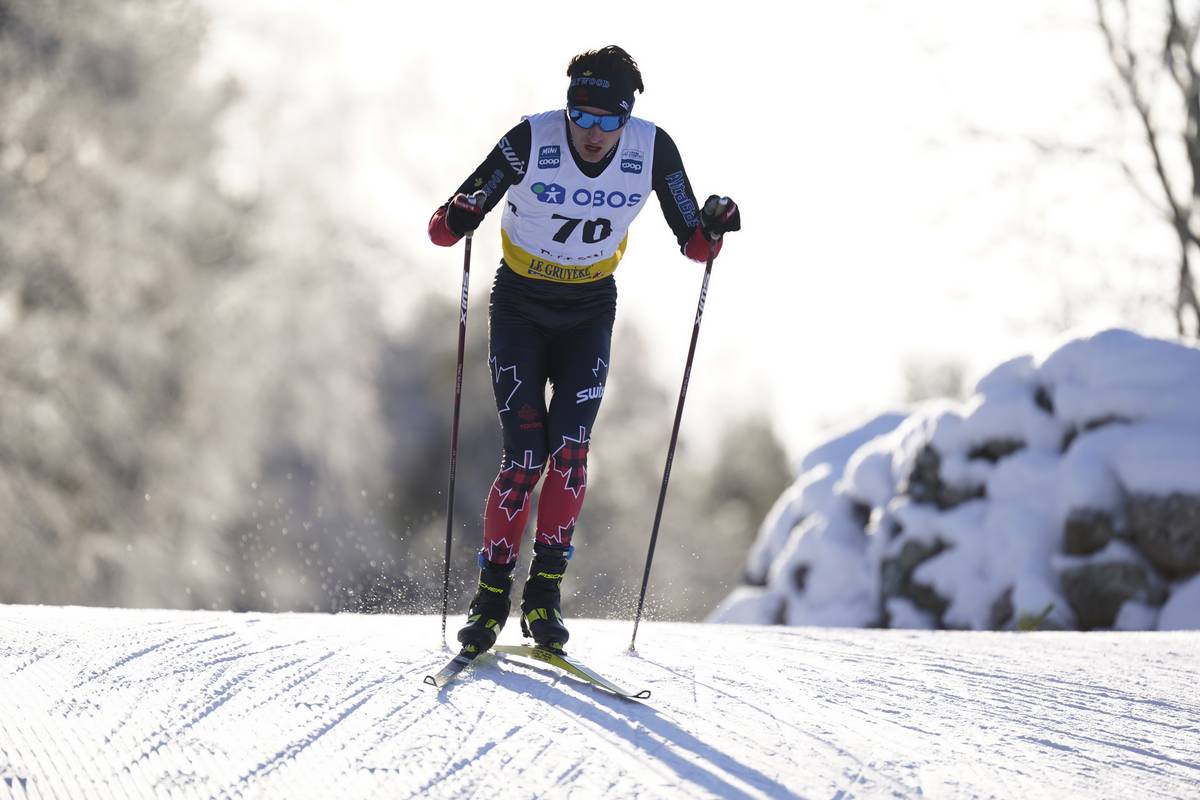
Up Next
“My plan is to compete in these early season races in Scandinavia then head back home for the Western Canada Cups. I think having this amount of high level racing before Christmas will allow me to be optimally prepared for the Olympic Trials races in January.”
Drolet was 6th in the free sprint at Sovereign Lake, and won the 15km individual classic.
After WCC weekend 1, Drolet reflected on his Euro trip.
“It was it was good, some [races] were better than others,” he said. “But it was I think it was really worthwhile to go over there and get some races in really early in the year against some really strong guys. I think it prepared us well for the season and I feel happy I went there.”
The opportunity to race at home in Rossland for the second Western Canada Cup weekend was derailed by an ‘atmospheric river’ storm that damaged the snowpack at ski areas through southern BC and that race weekend will now be held at the backup venue, Sovereign Lake.
Living in Rossland
“Whenever I think about it, I just feel extremely lucky to have been born here. I just love, love, love living here. So fortunate that I’ve lived here my whole life and been able to benefit from everything that comes with living in Rossland. And then, yeah, Dave moved here at just the right time for when my skiing career was getting started. And it’s all been really amazing.”
Watch this space for upcoming stories from Dave Wood recorded during this author’s recent trip to Rossland.

